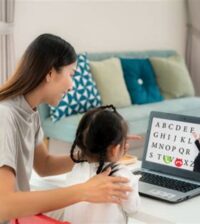- Belgium comes to Yamashita Park
- Residential Villa in Phuket Entices Remote Workers With Long-Stay Rates
- Rare pieces of French glass art at the Mirai Museum of Art
- Feast on fresh fish and seafood at the 2024 ‘Sakana’ Festival
- Would you like to ride in a Louis Vuitton gondola lift?
- Naked Snow Aquarium
- Festive lights at Yomiuriland will get you feeling the holiday vibes
The most loving way to say ‘no’.

I share lots of advice about toddler behavior because I know many parents find discipline issues intensely challenging. I was one of them. With my first child, especially, learning to recognize and respond effectively to her tests and limit-pushing behavior (which seemed to spring out of nowhere towards the end of her first year) took a concerted effort.
A father I consulted with recently shared a spot-on analogy that helped me understand my personal struggle and connect some dots.
He and his wife had been handling their toddler’s demands and clinginess with sensitivity, yet her behaviors were becoming more intense and frequent. I was recommending that they be more clear, direct, and unafraid of their child’s strong feelings when it suddenly clicked for him, “Oh, so this is like when someone wants to date you and you’re not interested, but instead of being direct you try to let them down easy…and then they don’t end up getting the message.”
Bingo. That analogy really resonated, because that was once me. I avoided confrontation and saying “no”. I didn’t want to risk hurting anyone’s feelings or make them angry at me. I did not want to be rejected, even when I was basically rejecting that person myself. I played it safe so I would continue to be “liked” and not create waves.
So, I made excuses and more excuses, rather than simply admitting, “Thanks, but I’m not interested in dating you.” Invariably, the guy would keep calling (no texting to hide behind back then, though I’m sure I would have appreciated it!), and I’d need to keep evading and avoiding him. I’d become increasingly annoyed and resentful. Can’t he take a hint? But whose fault was it? Mine, of course.
We can create a similar dynamic with our children. We “string them along” when we are not clear and direct, usually because we don’t want to face the music. Understandably. Screaming, crying and tantrums aren’t music to anyone’s ears, but when we attempt to avoid or tiptoe around our children’s feelings, their undesirable behavior and neediness usually continue (or crop up again later), and then we are the ones who end up screaming. We have only ourselves to blame.
The most loving way to say ‘no’ is directly, confidently and long before we become annoyed or angry. This isn’t about being harsh, and it’s definitely not punitive. It’s simply being decisive — projecting calm conviction.
It is best to use the actual word ‘no’ only occasionally, because children tune it out if we use it too much. It’s also not as respectful or clarifying as “I won’t let you, because that hurts,” or “I can’t let you, because that isn’t safe,” or “I can’t play with you right now. I need to get our dinner ready.”
However, when parents and children are having difficulties because the parents aren’t being direct and clear enough, I encourage them to say (or at least think in terms of) ‘no’, along with a very brief explanation. ‘No’ can help parents (and therefore children) feel more clear. Children will often let us know that they need even more clarity by continuing the limit-pushing behavior. They need to know we mean what we say and are comfortable following through and stopping them.
We can’t be clear with our toddlers if we don’t have clarity ourselves. This is why issues involving safety tend to be the easiest for parents to say ‘no’ to. Much more challenging are less clear-cut issues like:
Weaning
Separations that aren’t absolutely necessary (like we want to go to the bathroom or somewhere else in the house while leaving our child in a safe play area).
Bedtime and sleep issues (even less clear because we’re tired and our defenses our down).
Our child’s preference for one parent while with the other parent
Stalling
Another parent I consulted with recently was struggling to get comfortable setting limits with her toddler, but she was able to help me help her when she told me about the one situation that had always felt crystal clear: Insisting her son hold hands in the parking lot. Every time she brought up a situation in which she wavered (like when she needed him to finish his bath and sensed he was stalling), I’d remind her, “You’re holding his hand in the parking lot.” That’s how clear we need to be. Remember, there’s always the option of changing our mind (clearly) later.
Also remember that toddlers are incredibly aware, especially tuned in to their parents, and learning all the time. So the question is never “Are they learning?” It’s “What are they learning?”
- When we feel uneasy or unsure saying ‘no’ in a particular situation, and perhaps we try to coax, cajole, make it work for our child, she has no choice but to feel uneasy.
- If we worry about our child’s feelings in response to our boundaries (perhaps we tread lightly or try to console our “poor baby”), she has no choice but to feel uncomfortable with these feelings.
- When our kids sense us using kid gloves around them, they feel weak and incapable instead of healthy and willful like toddlers need to be, and they have no choice but to continue playing the role we’ve unwittingly chosen for them.
To make matters even murkier, while our children are getting messages from us through our every interaction, we are also getting input from them. So, our hesitancy to address guidance moments directly creates discomfort for our children, which they might express through clingy, needy behavior. Then (Egads!) our fears are confirmed: We see a fragile, anxious, needy child, whom we dare not disappoint. And the cycle continues.
So, parents are called to be brave and let their children off the hook by giving them direct responses. We must speak to our children’s strengths, rather than fearing their weaknesses. They deserve the truth. And they can handle it, but only if we believe they can.
Pre-order today!
No Bad Kids Master Course
Inspired by Janet’s bestselling book and more than 25 years of hands-on experience with parents and kids, this immersive course offers everything parents and teachers need to understand children’s behavior and put into practice the notion of discipline as an act of compassion and love. Releasing January 2023













